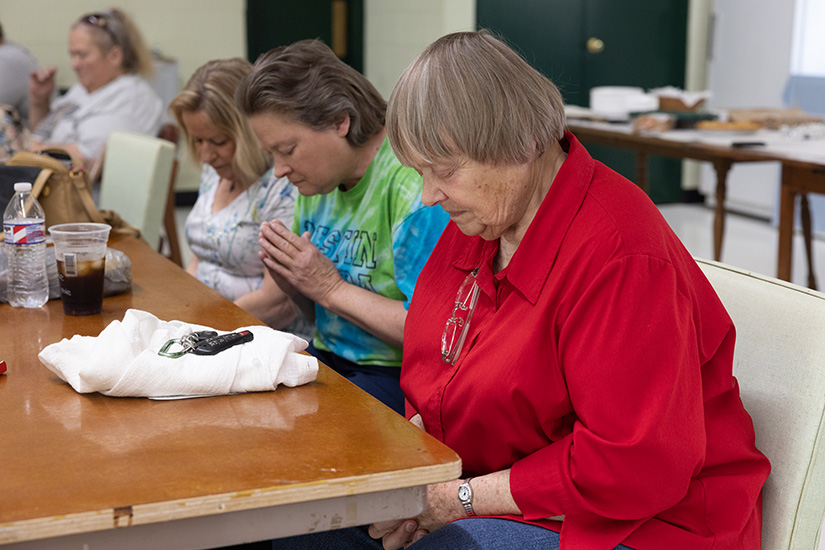 Neva Calvert, one of the Rural Parish Workers of Christ the King, bowed her head in prayer next to Lucy “Belle” Ward, a parishioner at St. Joachim in Old Mines, and Helen Bone of Potosi, during a St. Michael’s Day gathering May 17 at St. Michael House in Washington County.Photo Credit: Jacob WiegandUnder a steady July drizzle, Natalie Villmer and Neva Calvert stood on the gravel path in front of Virginia Bannister’s trailer, surveying the roof.
Neva Calvert, one of the Rural Parish Workers of Christ the King, bowed her head in prayer next to Lucy “Belle” Ward, a parishioner at St. Joachim in Old Mines, and Helen Bone of Potosi, during a St. Michael’s Day gathering May 17 at St. Michael House in Washington County.Photo Credit: Jacob WiegandUnder a steady July drizzle, Natalie Villmer and Neva Calvert stood on the gravel path in front of Virginia Bannister’s trailer, surveying the roof.
It had been leaking for some time, and Natalie and Neva — the two remaining vowed members of the Rural Parish Workers of Christ the King — were there to see how much work was needed to fix it.
“That board is where it started, I think, but now I see the water going all the way down in there,” Virginia said, pointing.
Inside, Virginia showed them where the water was seeping through and where she had repaired many rotted boards in the past.
“You’ve tried to keep up with it, haven’t you?” Neva said.
“Yeah, we’ve tried and tried,” Virginia replied.
Virginia has lived in the trailer a few miles south of Old Mines since 2003, but Natalie has known her since she was a child. The trio stood in the kitchen to talk it over: Would a new roof put too much weight on the water-damaged walls? Would building a second roof over the trailer, like a canopy, be possible? The dwelling had serious structural problems, and there wasn’t an easy answer. The drizzle outside had turned into a steady rain.
Virginia’s 3-year-old great-nephew ran a toy car through the length of the trailer, into the bedroom. He stopped to retrieve another car from his stash, next to a wall adorned with 12 carefully framed family photos and a hand-lettered sign above:
“With God, all things are possible.”
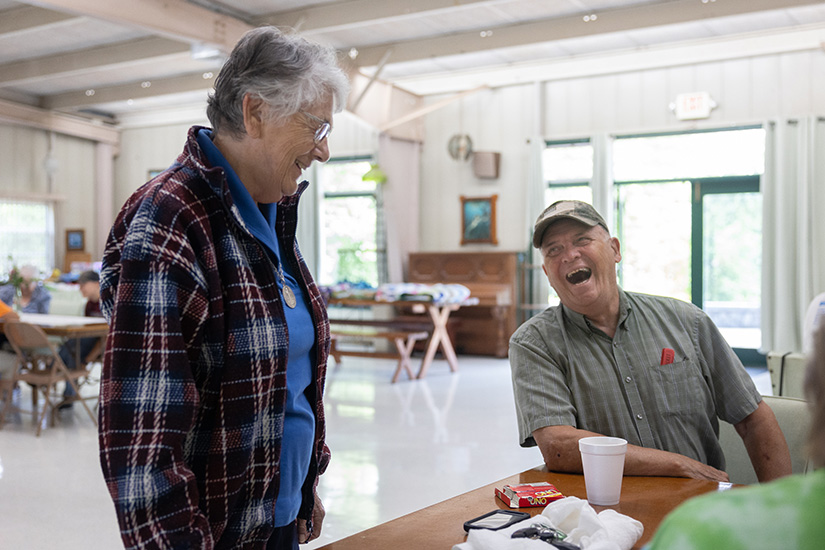 Natalie Villmer, one of the Rural Parish Workers of Christ the King, spoke with Joe Politte, a parishioner at St. Joachim in Old Mines, during a St. Michael’s Day gathering May 17 at St. Michael House in Washington County. Natalie has been a Rural Parish Worker since 1954.Photo Credit: Jacob Wiegand
Natalie Villmer, one of the Rural Parish Workers of Christ the King, spoke with Joe Politte, a parishioner at St. Joachim in Old Mines, during a St. Michael’s Day gathering May 17 at St. Michael House in Washington County. Natalie has been a Rural Parish Worker since 1954.Photo Credit: Jacob Wiegand
Serving the rural poor
Natalie and Neva left Virginia’s home and drove back up winding Highway 21 to the community’s 46-acre property in Fertile, where they headed inside the 1876 two-story brick house that has served as the community’s headquarters since 1949.
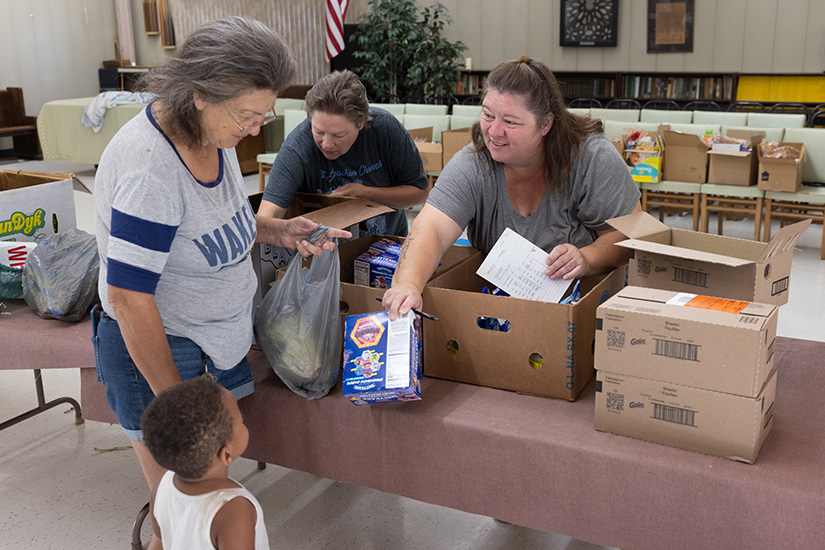 Malisa Minx, right, a parishioner at St. Joachim in Old Mines and volunteer with the Rural Parish Workers of Christ the King, assisted Virginia Bannister and her greatnephew Zander Dobbs during the Rural Parish Workers’ food pantry July 27 at St. Michael House in Washington County.Photo Credit: Jacob WiegandThe Rural Parish Workers of Christ the King were founded by St. Louisans Alice Widmer and LaDonna Hermann in 1942. With then-Archbishop John Glennon’s blessing, they began their service in Cottleville — at that time, a rural area. Father William Pezold of St. Joseph blessed their ministry in Cottleville on the feast day of Christ the King. In 1949, at the request of then-Archbishop Joseph Ritter, the Rural Parish Workers relocated to Fertile, not far from St. Joachim Parish in Old Mines.
Malisa Minx, right, a parishioner at St. Joachim in Old Mines and volunteer with the Rural Parish Workers of Christ the King, assisted Virginia Bannister and her greatnephew Zander Dobbs during the Rural Parish Workers’ food pantry July 27 at St. Michael House in Washington County.Photo Credit: Jacob WiegandThe Rural Parish Workers of Christ the King were founded by St. Louisans Alice Widmer and LaDonna Hermann in 1942. With then-Archbishop John Glennon’s blessing, they began their service in Cottleville — at that time, a rural area. Father William Pezold of St. Joseph blessed their ministry in Cottleville on the feast day of Christ the King. In 1949, at the request of then-Archbishop Joseph Ritter, the Rural Parish Workers relocated to Fertile, not far from St. Joachim Parish in Old Mines.
The community is a secular institute of the archdiocese: Members are laywomen who make vows of poverty, chastity and obedience and live in the tradition of the Rule of St. Benedict. They don’t use the title “Sister”; most people are accustomed instead to simply calling them “Miss Natalie” and “Miss Neva.” Their ministry is funded by donations, including through the Annual Catholic Appeal and the Friends of the Rural Parish Workers.
The Rural Parish Workers’ service to the people of Washington County is wide and varied as they work to provide for both the material and spiritual needs of those they encounter. On any given day, someone might come to the door seeking help with food, clothing, housing, rent, utilities, transportation, health care or other material needs. Often, the conversation might turn to God; sometimes, offering a Rosary to someone before they leave is an opening to connect with them about faith.
Natalie and Neva are members of and work closely with St. Joachim Parish, too. At least one of them typically serves on the parish council and the Society of St. Vincent de Paul, and they usually attend 8 a.m. daily Mass. The Rural Parish Workers collaborate with the parish to run a summer Vacation Bible School, inviting the children of the families they serve to come to the weeklong event.
Those simple invitations to Vacation Bible School have led to families joining the Church on several occasions, said Vicki Haynes, a St. Joachim parishioner and VBS director. “There have been some that surprised me — when we’re finished (with VBS), they’ll say, how do I get my kids into the PSR? How do I go to your church? What do I have to do to become Catholic?” she said.
The Rural Parish Workers’ involvement in the parish “keeps us focused on what Jesus wants us to do,” she said.
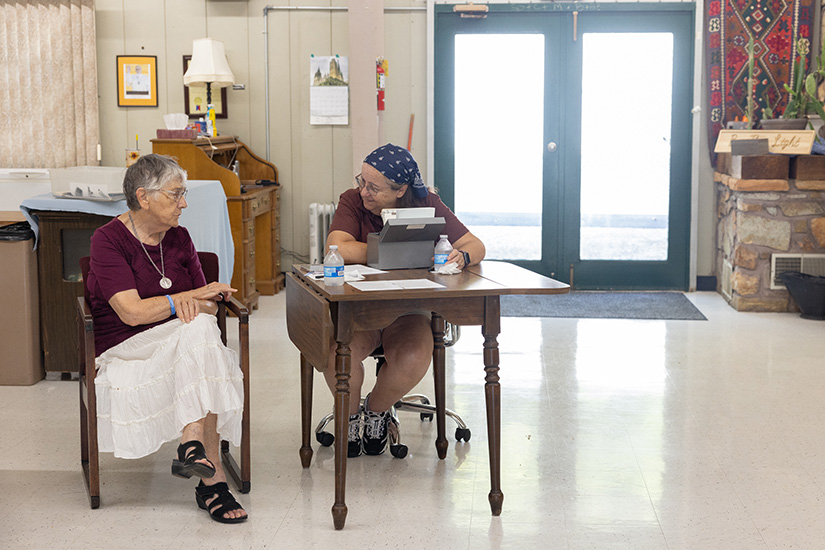 Natalie Villmer spoke with Kathy Coleman, the Rural Parish Workers of Christ the King’s administrative assistant, during the Rural Parish Workers’ food pantry July 27. Kathy has worked with the Rural Parish Workers for more than 30 years.Photo Credits: Jacob Wiegand
Natalie Villmer spoke with Kathy Coleman, the Rural Parish Workers of Christ the King’s administrative assistant, during the Rural Parish Workers’ food pantry July 27. Kathy has worked with the Rural Parish Workers for more than 30 years.Photo Credits: Jacob Wiegand
Creating community
At the Rural Parish Workers’ monthly food and clothing distribution on June 29, Malisa Minx lined up the full boxes of food as Kathy Coleman, the community’s administrative assistant, got ready to check people in.
Malisa has been volunteering with the community for 22 years. When Malisa’s mother moved away many years ago, “I just kind of attached to Miss Natalie, and she’s always been there, whether I needed something or just needed somebody to talk to.”
As people walked in to pick up food, Natalie, Kathy, Malisa and the other volunteers greeted almost everyone by name. They asked about their families, many of whom they know well. While there certainly are newcomers to the northern Washington County area, many families go back generations.
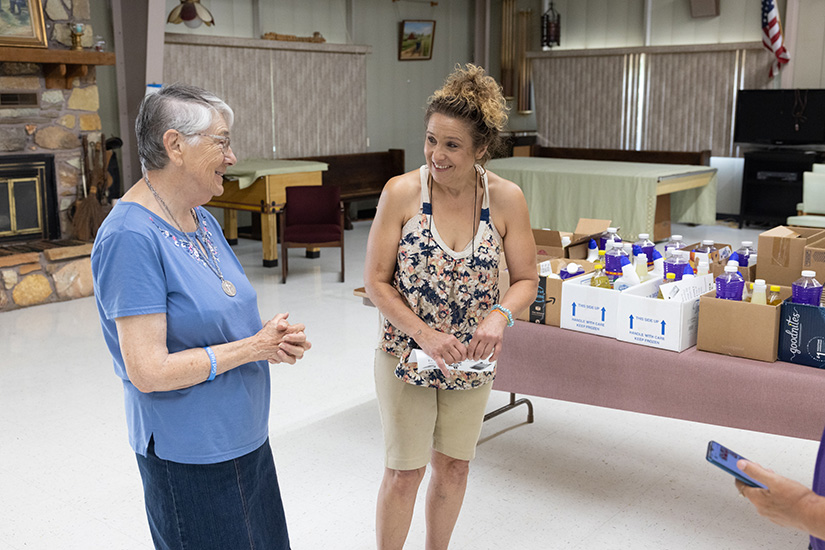 Natalie Villmer, one of the Rural Parish Workers of Christ the King, spoke with Cindy DeClue of Cadet during the Rural Parish Workers’ food pantry June 29 at St. Michael House in Washington CountyPhoto Credit: Jacob Wiegand“It makes it easier for them — you know, some families feel embarrassed about having to get help, and knowing somebody, it makes it easier,” Malisa said. “And then when you call them by their first name, they feel like they’re more of a friend or family than just a stranger coming for help.”
Natalie Villmer, one of the Rural Parish Workers of Christ the King, spoke with Cindy DeClue of Cadet during the Rural Parish Workers’ food pantry June 29 at St. Michael House in Washington CountyPhoto Credit: Jacob Wiegand“It makes it easier for them — you know, some families feel embarrassed about having to get help, and knowing somebody, it makes it easier,” Malisa said. “And then when you call them by their first name, they feel like they’re more of a friend or family than just a stranger coming for help.”
According to 2022 data from the U.S. Census Bureau, 19.4% of Washington County residents lived below the poverty line, compared to 12.7% statewide. Eighteen percent were food insecure, according to county health rankings from the same year.
When Kathy started working for the Rural Parish Workers 32 years ago, they regularly gave out about 100 boxes of food each month, she said; now, they average around 50. A big reason for that is the increase of food pantries in the county, she said.
Besides running the food distribution, Kathy takes care of the community’s bookkeeping and financial reporting, and she answers the door whenever Natalie and Neva are out and about. A native of Old Mines, she worked at St. Joachim School for many years before coming to the Rural Parish Workers. The experience “has helped me build my faith,” she said. “Years ago, I didn’t go to church as much. But since I came to work here, they’ve all had a good influence on me over the years.”
Up the road, volunteer Janice Black sorted clothing at Fertile Farms Thrift Shop. When Janice, a parishioner at St. Rose of Lima in De Soto, retired a few years ago, she sought a project. She offered to turn a storage building on the property into a thrift store to benefit the Rural Parish Workers.
The thrift store sells donated clothing, household items, toys and more, bringing in between $1,500-$2,000 a month for the community’s care account, to be distributed in direct aid to families. The Rural Parish Workers also give vouchers to people in need to shop for free.
With the help of a few more volunteers, including her son, Janice opens the store from 10 a.m.-2 p.m. Wednesday through Saturday.
“I know a lot of the people that come in now. I know their stories and their situations,” Janice said. “We have a whole relationship with a lot of people in the community that we never knew before. And we get some real characters in here, I’m telling you.”
This ministry of forming relationships and creating community is essential to the Rural Parish Workers and their companions. Over the years, they’ve hosted many prayer groups, youth gatherings, Bible studies and more in St. Michael House, built on the property in 1966.
As Natalie and Neva get to know people while serving them, they invite them into community with others. One of the best parts is seeing those people connect with others, they said.
“My favorite thing to see is when the people who have been given help turn around and want to reach out and help others,” Neva said.
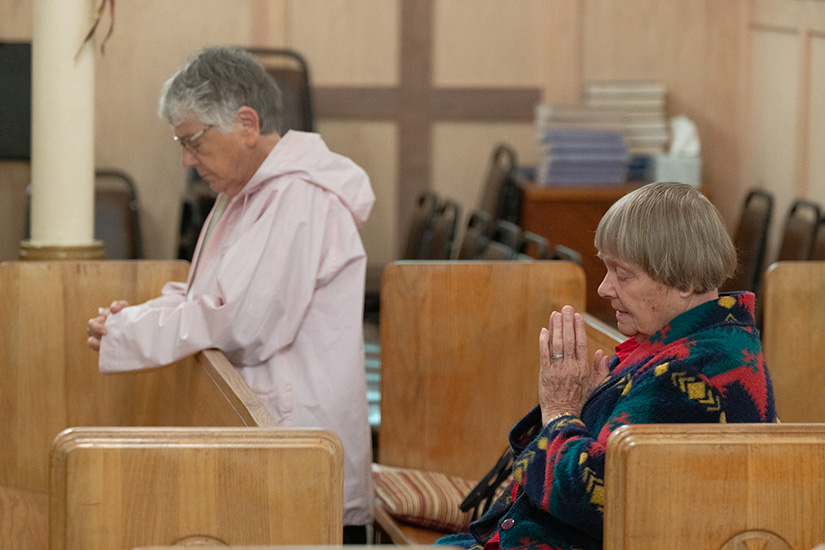 Rural Parish Workers of Christ the King Natalie Villmer and Neva Calvert attended morning Mass on July 19 at St. Joachim Church in Old Mines.Photo Credit: Jacob Wiegand
Rural Parish Workers of Christ the King Natalie Villmer and Neva Calvert attended morning Mass on July 19 at St. Joachim Church in Old Mines.Photo Credit: Jacob Wiegand
Two paths, same destination
Natalie and Neva came to the Rural Parish Workers through vastly different paths.
Natalie, a native of Old Mines and a St. Joachim Grade and High School graduate, met the Rural Parish Workers when they relocated to the area in 1949.
“They sponsored a summer program where women in high school could volunteer for six weeks and do Vacation Bible School and help out around here, so I volunteered for that,” she said. “I got interested in that way and decided I would really like to do this.” She entered the community in 1954 as a senior in high school, taking the bus to St. Joachim each day and heading back to serve right after.
She was attracted to the selfless way of life, and “the fact that they helped anybody who came to the door,” she said. “I was impressed by LaDonna — she was just a fantastic person. She always saw the good in everybody.”
Natalie professed first vows in 1955 and final vows in 1957, remaining ever since in the Old Mines community she loves dearly. She now serves on the board of the Old Mines Historical Society; at the recent 300th-anniversary celebration for the village of Old Mines, she led the choir in traditional French tunes.
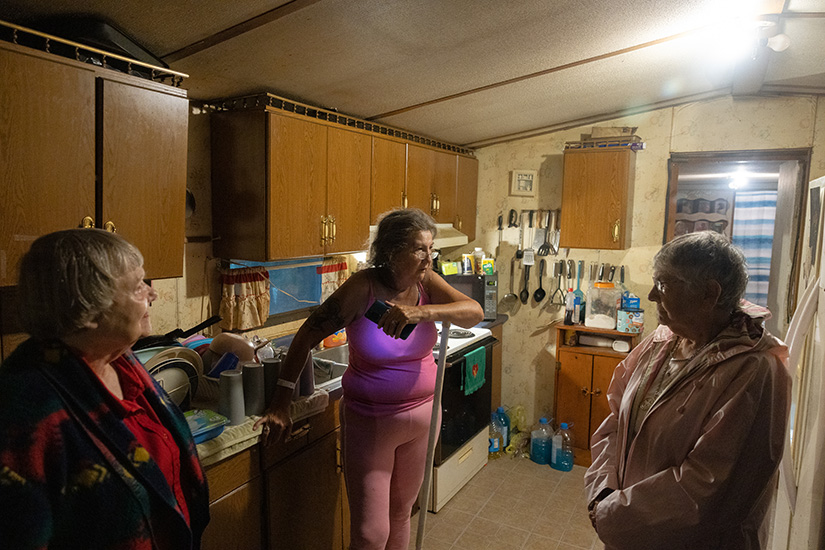 Rural Parish Workers of Christ the King Neva Calvert, left,
and Natalie Villmer, right, spoke with Virginia Bannister at her
home July 19 in Washington County. Natalie and Neva were
there to check out roof issues at the home.Photo Credit: Jacob WiegandNeva did not encounter the Rural Parish Workers until middle age. Born in Fulton, Kentucky, she grew up in the restaurant business with her family. She married in 1963 and had two boys, Kristopher and Cash, in the two following years.
Rural Parish Workers of Christ the King Neva Calvert, left,
and Natalie Villmer, right, spoke with Virginia Bannister at her
home July 19 in Washington County. Natalie and Neva were
there to check out roof issues at the home.Photo Credit: Jacob WiegandNeva did not encounter the Rural Parish Workers until middle age. Born in Fulton, Kentucky, she grew up in the restaurant business with her family. She married in 1963 and had two boys, Kristopher and Cash, in the two following years.
Not long after, her husband’s addiction to alcohol and other substances prompted her to leave for her boys’ safety. Neva found careers in the trades, becoming a licensed electrician and owning an HVAC company; and in the mental health field, serving as a counselor and developing an evening outpatient treatment program at Hyland Behavioral Health Center, among several other positions over the years.
She quit alcohol herself in 1967 and got involved in a 12-step program. A fallen-away Missouri Synod Lutheran, “The spiritual disciplines of that actually made way for me to come into the Church,” she said.
Neva met the Rural Parish Workers purely by chance at Vision of Peace Hermitage in the late 1990s. Her van broke down while she was on retreat, stranding her while she waited for a part to come in.
Kristopher had died several years prior from the disease of addiction. And Cash, who was born with a developmental disability, had found a home and job through Washington County Handicapped Services in Potosi. Neva was seeking direction in her life, she recalled.
“I encountered (the Rural Parish Workers), and there was just something special about them,” she said. The community was on its annual retreat, and she could tell that the members were exhausted, but in a beautiful way — exhausted from giving themselves totally in service of others.
Neva entered the community in 1998 and professed final vows in 2005, the most recent community member to do so.
She’s grateful to bring her life experiences with her in her ministry. If she made a house call to someone who needed a minor home repair, she could simply do it herself instead of paying a handyman. And over the years, she’s accompanied many people facing addictions as they work toward recovery.
While she might possess some useful skills, the ministry would be impossible without the strength of prayer and the sacraments, Neva said. She’s learned that “what’s important isn’t what I can do, or what I know, or what I’ve done in the past,” she said. “The way Christ approached people was, who you are, who I know the Father created you to be.”
The road ahead
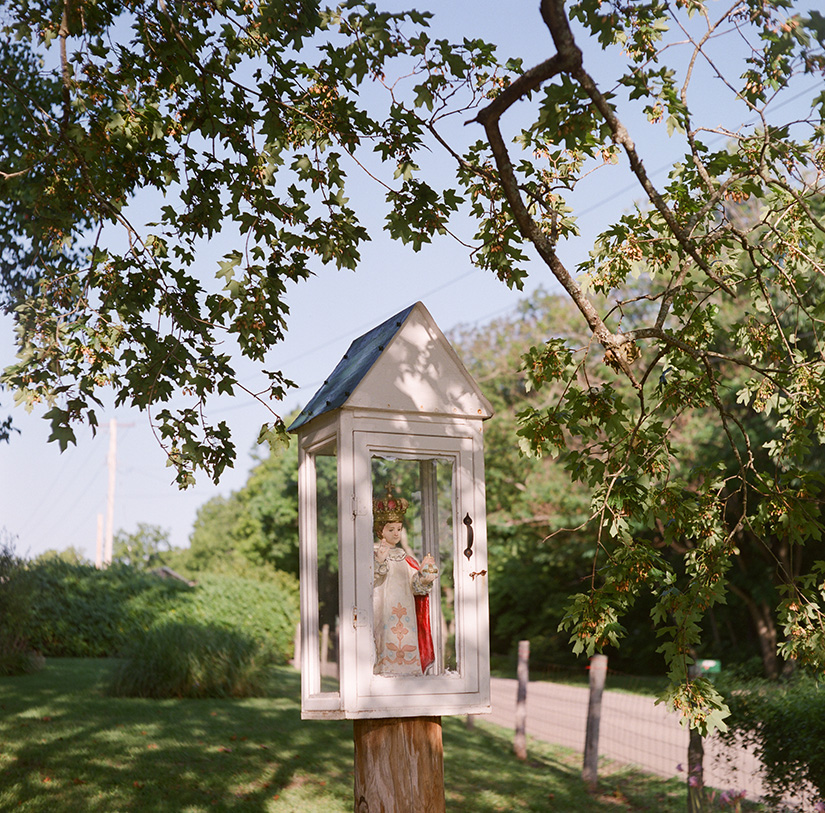 An Infant of Prague statue in a display case outside of the Rural Parish Workers of Christ the King’s main house. The Rural Parish Workers community is a secular institute of the archdiocese serving people in rural areas since the 1940s.Photo Credit: Jacob WiegandIn the 1970s and 80s, the Rural Parish Workers topped out at eight vowed members. Together, they attended daily Mass, prayed the Liturgy of the Hours and gathered for every meal. Members were able to split up the community’s work, with different people taking different assignments each day, Natalie recalled — visiting somebody, working on a rummage sale, putting together a mailing, answering the door, sorting clothing for a giveaway, teaching Vacation Bible School.
An Infant of Prague statue in a display case outside of the Rural Parish Workers of Christ the King’s main house. The Rural Parish Workers community is a secular institute of the archdiocese serving people in rural areas since the 1940s.Photo Credit: Jacob WiegandIn the 1970s and 80s, the Rural Parish Workers topped out at eight vowed members. Together, they attended daily Mass, prayed the Liturgy of the Hours and gathered for every meal. Members were able to split up the community’s work, with different people taking different assignments each day, Natalie recalled — visiting somebody, working on a rummage sale, putting together a mailing, answering the door, sorting clothing for a giveaway, teaching Vacation Bible School.
Now, as a community of two, the work hasn’t necessarily slowed down, Natalie said, but they rely more on volunteers’ help. She and Neva remain committed to their daily prayers, but their schedules often only allow them to come together for dinner and evening prayer (and an episode of Wheel of Fortune, if there’s time).
And Natalie, 85, and Neva, 76, don’t shy away from the looming question: If their community does not get any more vocations, what comes after they’re gone?
They believe the community’s volunteers and financial supporters are dedicated to the mission. The Rural Parish Clinic, which provides medical and dental care to people without insurance, now runs independently. Perhaps another religious order would be interested in coming to serve in the rural area, Neva said.
“One of the ideas we’ve already put into effect is to increase our advisory board, which would become a governing board and then hire somebody to do this so it wouldn’t close down,” Natalie said.
But for now, Natalie and Neva’s focus remains on simply serving the people God puts in front of them. They still needed to figure out how to fix Virginia’s leaking roof, after all.
“We’ll keep doing all we can as long as we can,” Neva said.
Rural Parish Workers of Christ the King
636-586-5171
www.rpwck.org
[email protected]
MAILING ADDRESS: 15540 CANNON MINES ROAD, CADET MO 63630
Friends of the Rural Parish Workers
The Friends of the Rural Parish Workers is a group of women who assist the mission through financial support, service, encouragement and prayer. The group sponsors an annual fashion show to raise funds for the Rural Parish Workers. This year’s event will take place on Oct. 13. For more information about the group, to buy fashion show tickets or to donate, visit friendsofrpw.com.
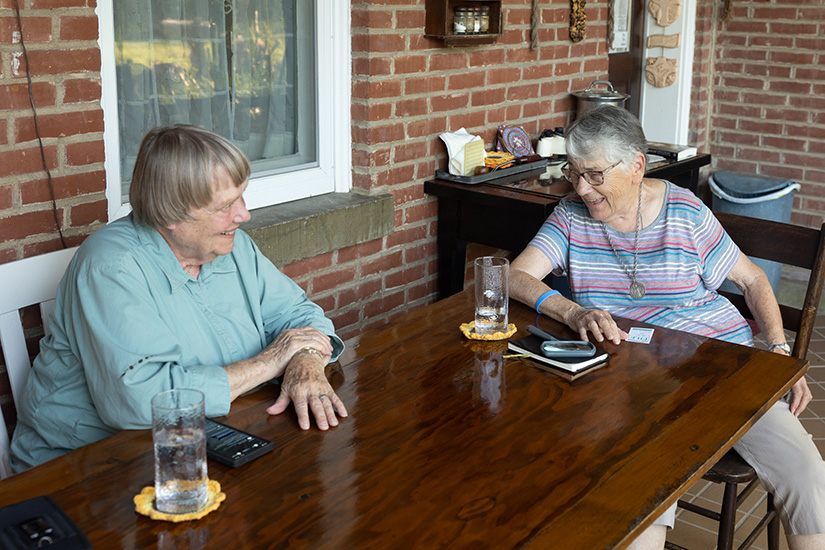 Neva Calvert and Natalie Villmer, both Rural Parish Workers of Christ the King, laughed after dinner and evening prayer July 26.Photo Credit: Jacob Wiegand
Neva Calvert and Natalie Villmer, both Rural Parish Workers of Christ the King, laughed after dinner and evening prayer July 26.Photo Credit: Jacob Wiegand